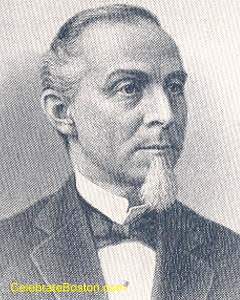 |
Mayor Thomas Norton Hart
Second Administration, 1900-1901
"Born in North Reading, Massachusetts, January 20, 1829; died October 4, 1927. First administration, 1889-90. His first administration was from 1878 to 1881.
In his first inaugural of January 1, 1900, Mayor Hart, who had been elected by a plurality of 2,281 over his Democratic opponent, called attention to an important oversight regarding the accumulating burden of debt incurred by the Commonwealth for certain large undertakings by the metropolitan boards. Boston's share of this metropolitan debt, he stated, has never been ascertained. He thought it amounted to not less than $20,000,000, but this liability appeared nowhere in the city's accounts. A communication on this subject from the State Auditor showed in 1900 a total metropolitan debt of $37,565,912, but this was a state and not a city debt. The city was only liable for the payment of annual assessments. State officials apparently regarded this debt in the same light.
In his inaugural of 1901, Mayor Hart discussed the confusing mixture of city, state and county government imposed on Boston, observing that this scattering of power 'would never have taken place had City Hall proved equal to all demands.' According to his view, home rule for Boston could probably be realized when 'playing games' ceased and municipal conditions became such .as to deserve it.
Under Mayor Hart, the memorable settlement was effected with the Commonwealth for Boston's water supply system, which had passed into the control of the Metropolitan Water Board in 1898. It was the largest financial transaction to which the city had been a part until then. In 1901, the administration was occupied with the rising costs of the schools, streets, new bridges, estimated to cost $2,750,000, the working of the eight-hour law for city employees, etc. On the subject of schools, Mayor Hart said, 'The transfer of government power from City Hall to the School Committee has plunged the latter into political confusion, and the financial rights of the School Department are not equal to its wants.' He favored the transfer of all the real estate operations pertaining to schools to a separate department, under control of the Mayor. This suggestion was adopted, and, by an act of 1901, the Schoolhouse Department was established, with three salaried commissioners, appointed by the Mayor, who should select school sites, plan, erect, repair and furnish school buildings, all appropriations for such remaining in charge of the School Committee.
The important project of the Charles River Basin came up for action in 1901. Mayor Hart recommended and the City Council accepted the legislative act providing for the appointment of a committee to investigate and report on the construction of a dam across the river between Boston and Cambridge. He favored a measure which would raise the tax to $12 and the debt limit to 2-1/2 per cent in order that Boston might be placed on the same footing as other cities. He wanted Boston to have enough borrowing capacity to complete the work already begun and to provide for other requirements. The General Court [state legislature] granted the request in regard to debt limit, but refused to raise the tax limit above $10.50."
